Research - (2021) Volume 9, Issue 8
A Study to Assess the Knowledge Regarding Admission Procedures in Government Hospitals among the First Year Diploma in Nursing Students at Govt. Rajaji Hospital, Madurai
Dominic Arockia Mary and AR Bharathi*
*Correspondence: AR Bharathi, Department of Nursing, Bharath Institute of Higher Education and Research, India, Email:
Abstract
Hospitals are organized institutions for the care of the sick and injured. The word Hospital comes from the word ‘hospes’ which means host. Every patient admitted to hospital should be considered as a unique person in terms of both personality needs and extent of illness. All fever cases are not the same in their needs even though they appear to be the same in the eyes of the nurses. A descriptive research design was chosen for this study. The simple random sampling technique was used for selecting the sample. The sample comprises of 30 students studying First year Diploma in Nursing, Government Rajaji Hospital, Madurai.
Keywords
Knowledge, Admission, Hospital, Nursing students
Introduction
When admitting a patient, it is important to remember that all nurses should be familiar of that hospital; hence it is a new and sometimes a frightening experience. Therefore, the nurses should make every effort to be friendly and courteous and make him feel that he will receive sympathetic as well as efficient care. The manners in which the patient and his family members are greeted and treated are most important. Therefore, the nurses and the personnel in the admitting department should be instructed the importance of admitting and treating all patients with interest and respect and to establish healthy personnel relationship to gain the confidence and cooperation of the patient and his family.
Every patient admitted to the hospital should be considered as a unique person in terms of both personality needs and extent of illness. The hospital routines should not be too rigid to fit only applicable to everyone. Every nurse should understand the behavioural patterns of patients according to the age, sex, race, cost and socioeconomic factors. Their needs should be met in an appropriate manner. The nurse should recognize the various needs of the patient and meet them without delay.
There is a tendency among the nurses to identify the patients either by the bed number or by the diseases that they suffer from. The nurses should address them by their name and proper title. Every patient expects the nurses to greet him pleasantly and enquire about his welfare every day. Every patient loves to use his own articles. Every patient should feel that he is considered and cared for. The nurses should find out the likes and dislikes of the patients [1-4].
Materials and Methods
A descriptive research design was chosen for this study. This study was conducted at Government Rajaji Hospital, Madurai. Which has the bed strength of 1500. In the school of nursing 550 students are studying and 30 students out of this are selected for this study. Considering the duration of data collection and sample size, the investigator selected this centre which is situated at the proximate distance. Students studying First year Diploma in the school of nursing of Government Rajaji Hospital, Madurai. The sample comprises of 30 students studying First year Diploma in Nursing.
Inclusion criteria
• Students studying in First year Diploma in Nursing at Government Rajaji Hospital, Madurai.
• Students who are attending duty during data collection.
• Students who can communicate in English only.
• Students who are willing to participate in the study.
• Students who are in sick.
• Students who are on leave.
• Students who are not willing to participate in the study.
30 students are studying in First Year Diploma in Nursing at Government Rajaji Hospital, Madurai.
Sampling technique
The simple random sampling technique was used for selecting the sample.
Data collection procedure
A written permission was obtained from the Dean and Principal In: Carpe. School of Nursing, Government Rajaji Hospital, Madurai.
The teaching staffs were made aware of the nature of the study and were assured the study would not affect their daily routine. The purpose of the study v. as explained to every respondent, to get their full cooperation. The investigator assured the participants for the confidentiality of their responses. The data was collected when they are in the rest time. Students who fulfil the criteria were accepted as a sample and information were collected from them. Adequate privacy was provided. Five samples were interviewed per day for 1 week.
The time duration of interview was about 45 minutes per sample. The items were repeated for better understanding and additional information provided in case any information needed for clarification.
Results
Regarding the educational qualification of the students, 97% are having Hr. Sec. Education, 3% are having college education. Regarding the previous medical field experience 57% of students are having vocational nursing, 10% of students worked in Private hospitals and 33% of students are not having previous medical field experience.
Regarding the area in which the students working during data collection, 40% of students are in medical ward, 20% are in surgical ward, 10% are in Postoperative ward, 17% are in Special ward and 13% are in Outpatient department (Table 1 and Figures 1 and Figure 2).
| Demographic variables | Frequency | Percentage |
|---|---|---|
| Age of the Students | ||
| 18-19 years | 5 | 17 |
| 19-20 Years | 17 | 57 |
| 20-21 years | 6 | 20 |
| >21 years | 2 | 6 |
| Educational Qualification | ||
| Hr. Sec. Education | 29 | 97 |
| Collegiate education | 1 | 3 |
| Previous Medical Field Experience | ||
| Vocational Nursing | 17 | 57 |
| Worked in a Private Hospital | 3 | 10 |
| No previous medical experience | 10 | 33 |
| Area in which working at the time of data collection. | ||
| Medical Ward | 12 | 40 |
| Surgical Ward | 6 | 20 |
| Post-Operative Ward | 3 | 10 |
| Special Ward | 5 | 17 |
| Outpatient Department | 4 | 13 |
Table 1: Frequency and percentage distribution of samples according to demographic variables.
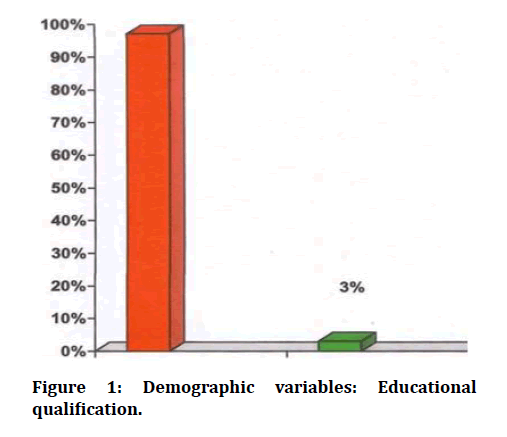
Figure 1: Demographic variables: Educational qualification.
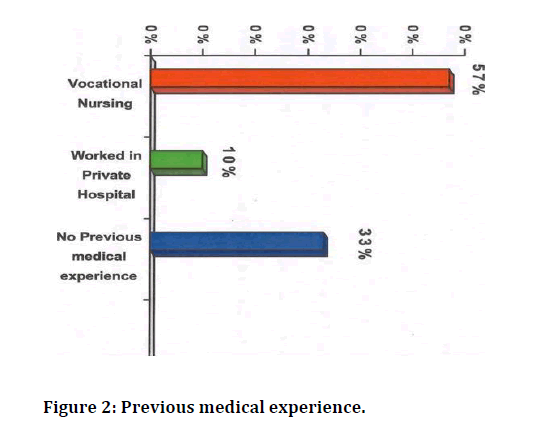
Figure 2: Previous medical experience.
Knowledge of students are interpreted as adequate, moderately adequate and in adequate. In this majority of the students having moderately adequate Knowledge < 80%), 13% of students having adequate knowledge and 7% of. Students having inadequate knowledge (Table 2, Figures 3 and Figure 4).
| Level of knowledge | Frequency | Percentage |
|---|---|---|
| Adequate | 4 | 13 |
| Moderately adequate | 24 | 80 |
| Inadequate | 2 | 7 |
Table 2: Frequency and percentage distribution of studentsâ?? knowledge regarding admission procedures in government hospitals.
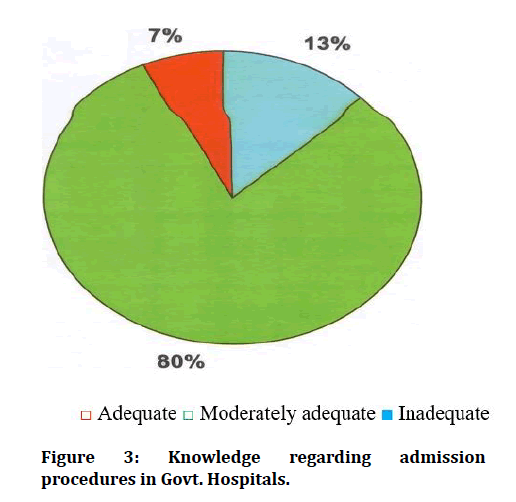
Figure 3: Knowledge regarding admission procedures in Govt. Hospitals.
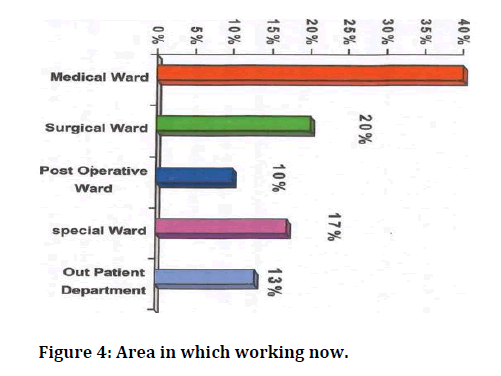
Figure 4: Area in which working now.
Result indicates that there is significant association between the knowledge of students on valuables of patients with no relatives and selected demographic variable that is previous medical field experience at 0.05 level of significance. Hence the null hypothesis is rejected, and the research hypothesis is accepted (Table 3 and Figure 5).
| Previous medical field experience | Kept safely by the nurse in her custody | Handed over to the ward doctor | Handed over to the administrative office. | Total |
|---|---|---|---|---|
| Vocational nursing | 4 | 1 | 12 | 17 |
| Worked in private hospitals | 1 | 0 | 2 | 3 |
| previous medical field experience | 8 | 1 | 1 | 10 |
| Total | 13 | 2 | 15 | 30 |
Table 3: Association between knowledge of students (valuables of the patients who has no relatives) and selected demographic variable (Previous medical field experience). 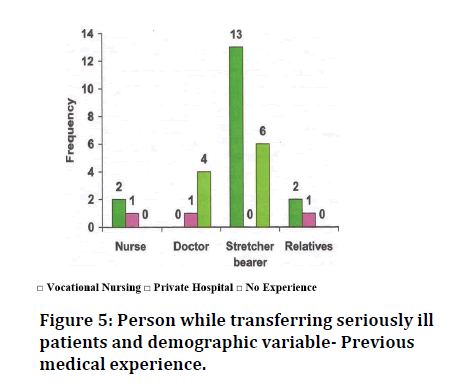
Figure 5: Person while transferring seriously ill patients and demographic variable- Previous medical experience.
Result indicates that there is no significant association between the knowledge of students on accompanying persons while transferring seriously ill patients from OPD to Ward and selected demographic variable that is previous medical field experience at 0.05 level of significance.
Hence the null hypothesis is accepted, and the research hypothesis is rejected (table 4 and Figure 6).
| Previous Medical field experience | Nurse should accompany | Doctor should accompany | Stretcher bearer alone is enough | Relatives are enough to accompany | Total |
|---|---|---|---|---|---|
| Vocational nursing | 2 | 0 | 13 | 2 | 17 |
| Worked in private hospitals | 1 | 1 | 0 | 1 | 3 |
| No previous medical field experience | 0 | 4 | 6 | 0 | 10 |
| Total | 3 | 5 | 19 | 3 | 30 |
%2=11.15 No significant at 0.05 levels
Table 4: Association between demographic variable (previous medical field experience) and knowledge (accompanying person while transferring seriously ill patients) of students. 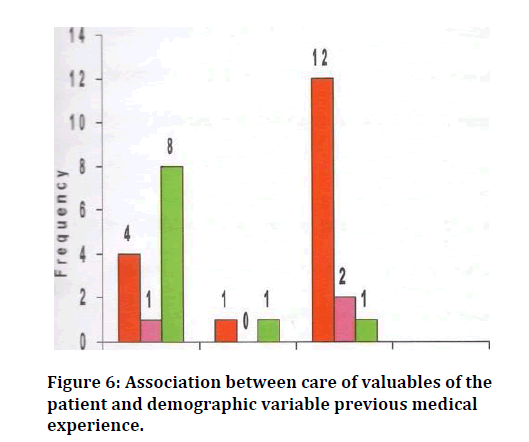
Figure 6: Association between care of valuables of the patient and demographic variable previous medical experience.
Discussion
The data presented in the Table I shows that 17% of students are in the age group of 18-19 years, 57% of students are in the age group of 19- 20 years, 20% of students are in 20-21 years and 6% of students are more than 21 years of age. Regarding the educational qualification of the students, 97% are having Hr. Sec. Education, 3% are having college education. Regarding the previous medical field experience 57% of students are having vocational nursing, 10% of students worked in Private hospitals and 33% of students are not having previous medical field experience.
Regarding the area in which the students working during data collection, 40% of students are in medical ward, 20% are in surgical ward, 10% are in post-operative ward, 17% are in Special ward and 13% are in Outpatient department.
Table II shows that the knowledge of students is interpreted as adequate, moderately adequate and inadequate. In this, majority of the students having moderately adequate knowledge (80%), 13% of students having adequate knowledge and 7% of students having inadequate knowledge.
Table III indicates that there is significant association between the knowledge of students on valuables of patients with no relatives and selected demographic variable that is previous medical field experience at 0.05 level of significance. Hence the null hypothesis is rejected, and the research hypothesis is accepted.
Table IV indicates that there is no significant association between the Knowledge of students on accompanying persons while transferring seriously ill patients from OPD to Ward and selected demographic variable that is previous medical field experience at 0.05 level of significance. Hence the null hypothesis is accepted, and the research hypothesis is rejected [5-8].
Conclusion
For data analysis descriptive and inferential statistics were used. Regarding the knowledge of students are interpreted as adequate, moderately adequate, and inadequate. In this, majority of the students having moderately adequate knowledge (80%), 13% of students having adequate knowledge and 7% of students having inadequate knowledge. The statistical analysis is proved that there is significant association between the knowledge of students on valuables of patients with no relatives and selected demographic variable that is previous medical field experience at 0.05 level of significance. Hence the null hypothesis is rejected, and the research hypothesis is accepted. It also proved that there is no significant association between the knowledge of students on accompanying persons while transferring seriously ill patients from OPD to Ward and selected demographic variable that is previous medical field experience at 0.05 level of significance. Hence the null hypothesis is accepted, and the research hypothesis is rejected. As the admission procedures are well known to the nursing students there is a need arises for health care providers to assess the knowledge of nursing students regarding admission procedures in government hospitals and pre-plan for their education.
Funding
No funding sources.
Ethical Approval
The study was approved by the Institutional Ethics Committee.
Competing Interest
The authors declare no conflict of interest.
Acknowledegements
The encouragement and support from Bharath University, Chennai is gratefully acknowledged. For providing the laboratory facilities to carry out the research work.
References
- Asopa HN. Procedures in nursing Practice. 1st Edn. Mumbai: Voral Medical Publications 2004; 39-44.
- Basvanthappa BT. Fundamentals of nursing. 1st Edn. New Delhi: Jaypee Brothers Medical Publication 2002; 244-248.
- Madhuri Inamdar. Textbook of fundamentals of nursing part I. 1st Edn Bombay: Voral Medical Publications 2003; 49-50..
- Nancy. Principales and practice of nursing. 5th Edn Indore: N.R.Publications house 1996; 104-1127.
- Polit & Hungler. Nursing research principles and methods. 6th Edn. Philadelphia: J.B. Lippincott Company 1999.
- Shakuntla Sharma Birpuri. Principles and practice ofnursing. 1st Edn. New Delhi: Jaypee Brothers Medical Publishers (P) Ltd. 1997; 43-49.
- Sundar Rao, Richard. An introduction to Bio-statistics J. 3rd Edn. Philadelphia: T.B. Lippincott company 1997.
- Thresyamma CP. Fundamentals of nursing procedure manual for general nursing and midwifery course. 1st Edn New Delhi: Jaypee Brothers Medical Publishers (P) Ltd., 2003; 43- 46.
Author Info
Dominic Arockia Mary and AR Bharathi*
Department of Nursing, Bharath Institute of Higher Education and Research, Selaiyur, Chennai, Tamil Nadu, IndiaCitation: Dominic Arockia Mary, AR Bharathi, A Study to Assess the Knowledge Regarding Admission Procedures in Government Hospitals among the First Year Diploma in Nursing Students at Govt. Rajaji Hospital, Madurai , J Res Med Dent Sci, 2021, 9(8): 291-296
Received: 17-Jul-2021 Accepted: 23-Aug-2021
